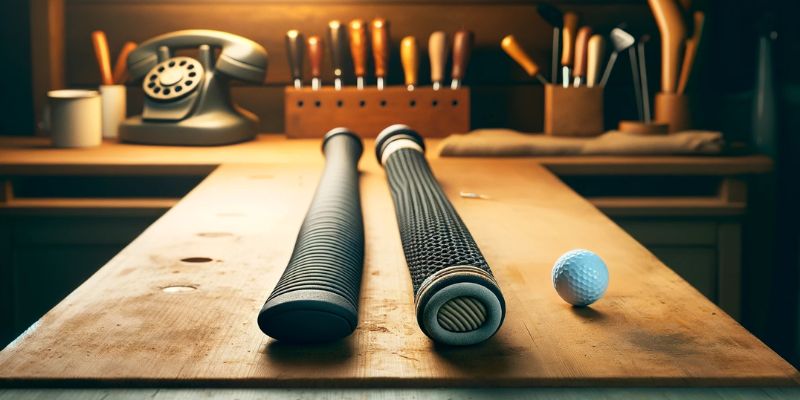Golf grips comparison, understanding the differences between corded and rubber grips can significantly impact your choice and performance on the course.
This article explores the characteristics of both types of grips, delves into their respective benefits, and guides you through choosing the right option for your style of play.
Characteristics of Corded Grips
Corded golf club grips are known for their distinct feel and performance-enhancing features.
Here’s what sets them apart in a golf grips comparison:
Texture and Material
Corded grips are made by embedding tiny cords into the rubber, adding a rougher texture to the grip’s surface.
This design is intended to provide enhanced traction, making corded grips an excellent choice for playing in wet or humid conditions.
The cords help wick away moisture, ensuring that the grip remains tacky and secure in your hands despite the weather.
Durability
Another significant advantage of corded grips is their durability.
The cord material interwoven with the rubber not only improves grip but also extends the life of the grip itself.
Corded grips are less prone to wear and tear compared to their all-rubber counterparts, making them a wise choice for golfers who play frequently or in diverse conditions.
Feedback
Corded grips are typically firmer, offering better feedback with each shot.
This can be particularly beneficial for experienced golfers who rely on subtle cues from their equipment to fine-tune their game.
The enhanced feedback helps in adjusting swing strength and style according to the demands of the shot.
Benefits of Rubber Grips
Rubber grips, on the other hand, offer their own set of advantages, making them a popular choice among golfers of all skill levels.
Here’s why many opt for rubber in a golf grips comparison:
Comfort
Rubber grips are generally softer and more comfortable than corded grips.
They are designed to absorb more vibration, providing a gentler feel on impact, which can reduce hand fatigue and discomfort during a long day on the course.
This makes them particularly appealing to recreational golfers or those with hand sensitivity.
Variety of Designs
Rubber grips come in a wide range of textures, from smooth to heavily patterned, allowing for a personalized feel and functionality.
This variety lets golfers choose grips that best fit their hand size and personal preference, enhancing comfort and effectiveness.
Cost-Effectiveness
Typically, rubber grips are more affordable than corded options.
This cost-effectiveness makes rubber grips an attractive option for golfers looking to outfit multiple clubs at a reasonable price, or for those who prefer to replace their grips frequently to maintain optimal performance.
Which Should You Choose?
Choosing between corded and rubber grips often comes down to personal preference and playing conditions:
Consider Your Environment
If you frequently play in wet or humid conditions, corded grips might be the better choice due to their superior moisture management.
For drier climates, rubber grips could offer more comfort and sufficient performance.
Assess Your Needs for Comfort vs. Feedback
Rubber grips might be the way to go if you prioritize comfort and have a more casual approach to the game.
If you’re a more experienced golfer looking for detailed feedback to refine your technique, corded grips could provide the precision you need.
Try Both
Ultimately, the best way to decide is to try both types of grips in various conditions.
Many golf retailers offer demo grips or can re-grip one or two of your clubs as a test before you commit to a full set.
In conclusion, the golf grips comparison between corded and rubber grips highlights distinct benefits that cater to different golfing styles and needs.
Whether you choose corded for its durability and feedback or rubber for its comfort and variety, selecting the right grip can be a game-changer.
Remember, the best grips are the ones that feel right in your hands and improve your confidence and performance on the course.
What are the main differences between corded and rubber golf grips?
Golfers often ask about the distinct characteristics of corded versus rubber grips, including differences in texture, material, and overall feel.
Which type of grip is better for wet conditions?
Players looking to perform optimally in wet or humid conditions might inquire about which grip type offers better moisture management and traction.
Are corded grips more durable than rubber grips?
Durability is a common concern, prompting questions about whether corded grips, with their embedded cords, indeed last longer than plain rubber grips.

